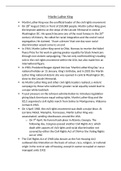Martin Luther King
Martin Luther King was the unofficial leader of the civil rights movement
On 28th August 1963, in front of 250,000 people, Martin Luther King gave
the keynote address on the steps of the Lincoln Memorial in central
Washington DC. His speech became one of the most famous in the 20 th
century US history. He called for racial integration and the end of racial
segregation. He claimed, ‘I have a dream’ that one day soon racial
discrimination would come to an end
In 1964, Martin Luther King went to Ohio, Norway to receive the Nobel
Peace Prize for his work in gaining greater equality for black Americans
through non-violent campaigning. This not only confirmed King’s leading
role in the civil rights movement within the USA, but also made him an
international figure.
In 1983, President Reagan signed into law ‘Martin Luther King Day’ as a
national holiday on 15 January, King’s birthday, and in 2001 the Martin
Luther King national Historic site was opened in central Washington DC,
close to the Lincoln Memorial.
As Martin Luther King and other civil rights leaders realised, a violent
campaign by those who wished for greater racial equality would lead to
a major white backlash
To put pressure on the Johnson administration to introduce legislation
giving black Americans equal voting rights, Martin Luther King and the
SCLC organised a civil rights march from Selma to Montgomery, Alabama
in March 1965.
On 4 April 1968, the civil rights movement was dealt a major blow. At
Lorraine Motel, Memphis, Tennessee, Martin Luther King was
assassinated, sending shockwaves around the USA.
o On 9th April, his funeral took place in Atlanta, Georgia. The
following day, Congress passed another Civil Rights Act, which
dealt with aspects of civil rights and racial discrimination not
covered by either the Civil Rights Act of 1964 or the Voting Rights
Act of 1965
The Civil Rights Act of 1968 (also known as the Fair Housing Act)
outlawed discrimination on the basis of colour, race, religion, or national
origin in the rent or sale of housing, except in owner-occupied or owner-
managed units (142)




